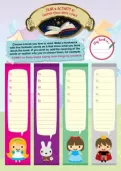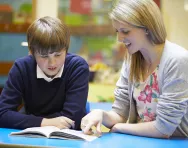TheSchoolRun.com closure date
As we informed you a few months ago, TheSchoolRun has had to make the difficult decision to close due to financial pressures and the company has now ceased trading. We had hoped to keep our content available through a partnership with another educational provider, but this provider has since withdrawn from the agreement.
As a result, we now have to permanently close TheSchoolRun.com. However, to give subscribers time to download any content they’d like to keep, we will keep the website open until 31st July 2025. After this date, the site will be taken down and there will be no further access to any resources. We strongly encourage you to download and save any resources you think you may want to use in the future.
In particular, we suggest downloading:
- Learning packs
- All the worksheets from the 11+ programme, if you are following this with your child
- Complete Learning Journey programmes (the packs below include all 40 worksheets for each programme)
You should already have received 16 primary school eBooks (worth £108.84) to download and keep. If you haven’t received these, please contact us at [email protected] before 31st July 2025, and we will send them to you.
We are very sorry that there is no way to continue offering access to resources and sincerely apologise for the inconvenience caused.
Could reading make your child happier?

Mental health is a growing concern for children today. Depression and anxiety may sound like very adult issues, but 10% of kids have a diagnosable mental health condition – that’s three in every classroom – and half of all mental illnesses start before a child is 15.
As parents, we want to do everything we can to protect our children’s emotional wellbeing. And according to new research from the National Literacy Trust, the answer could be right there on your bookshelf. To mark its 25th anniversary, the charity conducted research into how literacy affects children’s mental health.


Claim A FREE Book Reviews Activity Pack!
- A huge collection of creative writing & reading comprehension resources
- Explore texts, deepen understanding, share opinions
- For Year 1 to Year 6
‘Children and young people today face a multitude of pressures at school, at home and in their social lives,’ explains director Jonathan Douglas. ‘We believed that reading and writing had a strong impact on wellbeing, but we wanted to prove this was the case.’
Sure enough, the study showed that children who enjoy reading and writing and do it regularly outside school are three times more likely to have high levels of mental wellbeing than those who are less engaged with literacy.
Why do reading and writing improve children’s mental wellbeing?
We adults know the pleasure of losing ourselves in a good book and escaping from the world for a short while, and children too can benefit from the sense of escapism that reading brings.
Lou, who’s mum to 12-year-old Elliott, has seen this in action. ‘Reading seems to relax my son and make him calmer,’ she explains. ‘It’s a form of escapism from the always switched-on world that we live in. I find he’s more hyper and sensitive if he’s been on tech for too long, while reading makes him happier and more relaxed.’
Children who read and write for pleasure are more able to develop the emotional literacy skills that they need to take control of situations where they might feel vulnerable. Reading broadens their vocabulary so they can express their feelings more accurately, while writing – whether that’s stories, poems, a diary or even notes to friends – gives them an outlet for their emotions.
Indeed, the study found that children who have a low verbal ability tend to have poorer mental health than children with a high verbal ability.
‘Being able to read and write well means that children can make sense of how they’re feeling, express their thoughts and emotions, and seek support,’ explains Jonathan. ‘It can also help to increase their self-confidence and self-awareness, and foster an interest in learning and understanding other points of view.’
The link between literacy and mental wellbeing is particularly strong in primary school children aged eight to 11. The National Literacy Trust’s research showed that as children move on to secondary school, their enjoyment of reading starts to diminish – and that coincides with a downward trend in their mental health.
Making sense of emotions through books
Any sort of reading is good for the soul, giving kids time-out from their busy, tech-centred lives and helping them to relax and unwind. Fiction, comics, poetry and picture books all have a place in improving children’s mental wellbeing.
‘There are lots of brilliant fiction books that weave in mental health messages as part of the storyline, but non-fiction can be great, too,’ Jonathan explains.
‘If your child is facing a particular problem, reading a non-fiction book that covers the subject can help them make sense of what they’re going through, and feel that they are not alone,’ he continues. ‘For younger children, picture books can provide a great way to talk about difficult topics, and they can even be helpful for older children, as they can tackle sensitive topics in a simple, clear way.’
But books don’t have to have an overriding mental health theme to benefit your child. ‘Reading a funny book will make them laugh and feel happier, while audiobooks are great for enjoying stories and still gaining all the associated benefits,’ Jonathan says.
Reading alone or reading together?
We often phase out reading to our kids once they can read independently themselves, but continuing to share books together brings many additional benefits, including fostering closeness and conversation and developing empathy and listening skills. All of these can have a knock-on effect on their mental health.
‘Reading books which discuss wellbeing and mental health together can provide a great way to start conversations about emotions that children may be experiencing and struggling with,’ Jonathan explains. ‘Research also shows that children who read with someone at home say it helps them to feel calmer and happier.’
The bedtime story is a nice tradition to continue even once your child is confident reading alone. ‘Reading before bedtime helps children switch off from the day, and prepares them for a good night’s sleep and to wake up refreshed,’ Jonathan says.
Stacey, mum to Zak, nine, and Poppy, six agrees. ‘We spend time reading before bed every night,’ she says. ‘There’s so much pressure on children nowadays that a little time unwinding has got to be a good thing. I find reading a book relaxing and refreshing, so surely it’s the same for children.’
Visiting the library together is another good way to share books with your child and tap into the wellbeing benefits of reading. Research has shown that library users are more satisfied with their lives, and it also opens up a whole world of books on a vast range of different topics to help broaden your child’s emotional literacy.
Five of the best books for mental wellbeing
Pass It On by Sophy Henn (age 3-5): an uplifting picture book about finding joy in the little things in life.
Me and My Fear by Francesca Sanna (age 5-7): when a girl starts at a new school, Fear makes her alone and afraid – but she learns to overcome it by sharing it with others.
Happy, Sad, Feeling Glad by Yasmin Ismail (age 5-7): a book that helps children explore their emotions through drawing and doodling.
The Goldfish Boy by Lisa Thompson (age 7-11): 12-year-old Matthew has to overcome his crippling OCD to help solve the mystery of a toddler’s disappearance.
The Land of Neverendings by Kate Saunders (age 7-11): an exciting adventure story that also covers themes of grief and sadness.
The National Literacy Trust also has a comprehensive list of children's books that promote mental wellbeing.








